How to Write Catchy Headlines
An attention grabbing catchy headline must promise what you’re going to provide the reader and it must add value. For people to take an interest in your work, having a catchy headline is vital. It’s a compelling headline that will make or break your content.
On average, five times as many people read the headlines as read the body copy. David Ogilvy
Tweet this1. Know your audience
When you know the motives and pain points of your audience, writing an attention worthy headline is easy. People are emotionally driven. By offering a solution to your audience’s problem will help people take notice and read on. The more you can understand your customer’s needs, the greater advantage that you’ll have.
2.Get straight the point, keep it simple short and concise
An excellent headline gets straight to the point of your content. People are busy. So, get to the point. Highlight the benefits of content to the reader. Your headline must answer “what’s in it for the reader?”
3.Keyword research
It’s important to understand how potential customers search for your business in the search engines. One of the easiest methods is to do a Google Search to ensure that the intention of your search query aligns with the search results.
For example, a business owner that’s searching for an “outsourced hr company” will expect to see a variety of “Outsourced HR Services”.
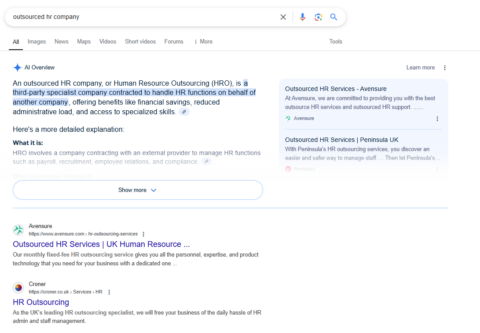
There are many keyword tools online to assist such as Google Keyword Planner, Answer the Public and even Questiondb.io. In the example below, are keyword suggestions that are relevant to “outsourcing HR” from Questiondb.io.
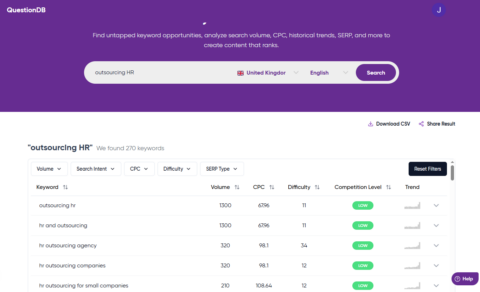
When creating that important headline, it’s essential to include one relevant search term that your target audience is searching for.
4. Generate ideas faster than ever before with ChatGPT
There are many ways to generate compelling headlines for your content. You can also use ChatGPT as a starting point.
Let’s use the example of a HR company and it’s looking to generate a content piece on the “benefits of using an outsourced HR company”. The target audience is business owners and those in business management.
Within ChatGPT, we can use the following prompt as a starting point:
“Create ten headlines for a content piece that highlights the benefits of using an outsourced HR company. The tone must be professional and needs to include some of the following terms “outsourcing HR” or “outsourced HR company”.
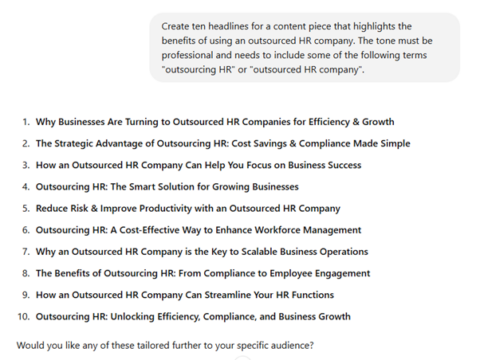
This is a very good starting point to generate some ideas. You can take this a step further by including the some of the pain points that businesses have. For instance, “saving time” and “saving money”.
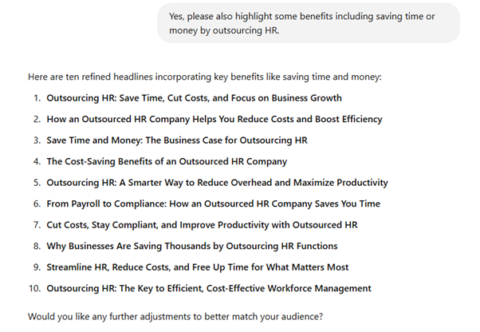
You can refine titles even further. In this example, there’s examples of titles that highlight the paint point of complying with “UK employment law changes” .
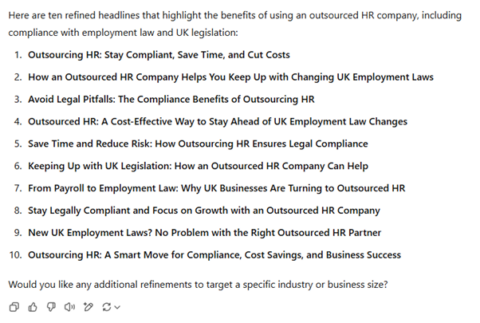
5. Solve a problem
If you can offer your readers a helpful tip, or an answer to the question they’re looking for, then it’s likely they are going to want to read your post.
Think about that when it comes to developing the headline.
These types of titles are usually found on ‘How To’ or ‘X ways to’ posts, and instantly communicate the benefits of the article in one sentence.
This once again goes back to researching your audience. Analyse on-site search queries, if you have site search setup in Google Analytics 4, and explore the long tail variations of popular keywords related to your brand. Use that data to formulate an impactful title. Alternatively, you can use Answer the public to highlight which questions are popular with your target market.
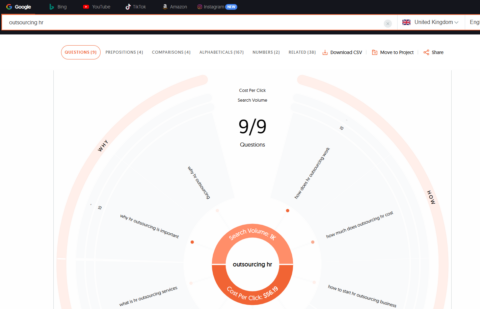
6. Offer New Insights
Do your posts contain unique data? Then this is your chance to get ultra-specific.
Use attention-grabbing facts and figures to draw your users in. These kinds of titles are great for press releases, as they present digestible data directly to the audience.
Examples include:
- Survey findings reveal…
- X% of people believe…
- New study shows…
7. Have An Opinion
Sometimes, it’s ok to disagree.
Conflicting opinions breed new ideas, and if you create an opinion piece, then you get the chance to pose a new take on a topic for your readers.
The articles themselves can take all shapes and sizes, but these titles tend to begin with “why, what, or how”, and often succinctly portray your attitude towards the topic.
8. Create Speculative Titles
Speculative titles can be tricky to get right. On one hand, you can draw readers in by accessing the rumour mill and reporting on possible scoops; on the other hand, you could end up lying to your followers, and looking worse for it.
Positive speculation can help you break news early, and gain a reputation as a reliable source, especially if you have the facts to back it up within the article itself.
Just don’t abuse the power. Ian Lurie has written a great post on Portent about the dark side of speculative titles, and how Internet marketers use negative connotations to help drive views. This works well for gossip articles, or a piece that covers popular news, and upcoming releases, but less so for factual articles.
9. Make Them Laugh

Puns! You either love them or you hate them.
If your subject matter isn’t too serious, and you have the chance to crack wise in your title, why not go for it?
Humour is a tricky tactic to get right though, and the best kind of funny headlines tend to focus on wordplay or simple puns, rather than poking fun at a particular topic or person.
10. Use numbers in your headlines
Make sure that you start a headline with a number. For example, this article is called “10 Tips for Creating Catchy Headlines” this also delivers a promise to the reader.
BuzzSumo analyzed 100 million articles and can confirm that numbers work in headlines. As a result, headlines that contain 10 work the best.
Further resources:
Still hungry for more headline writing tips?
Check out these great Koozai Posts:
The Anatomy Of A Perfect Blog Post That Gets Results
Take a look at these helpful resources:





Leave a Reply